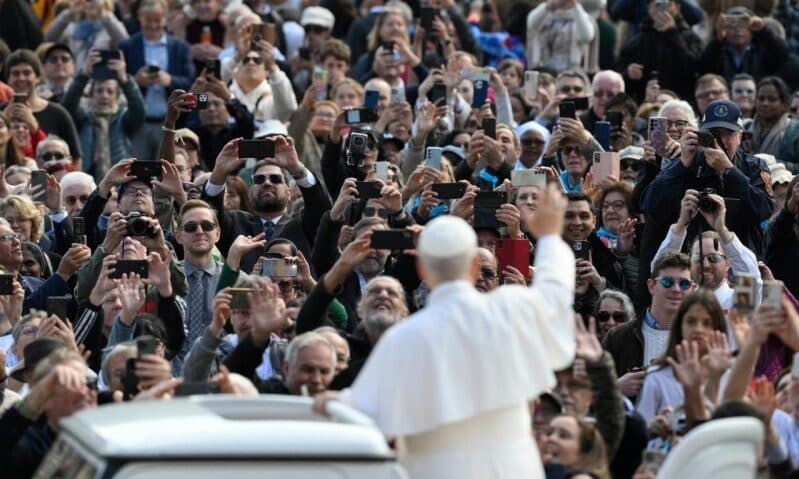On Wednesday, Pope Leo XIV said the Catholic Church does not tolerate anti-Semitism and fights against it, “on the basis of the Gospel itself.”
Speaking in St. Peter’s Square for the weekly General Audience, the pontiff said he was confirming his predecessors, who “have condemned anti-Semitism with clear words.”
“Sixty years ago, on 28 October 28, 1965, Vatican Council II, with the promulgation of the Declaration Nostra Aetate, opened up a new horizon of encounter, respect and spiritual hospitality,” he said on Oct. 29.
“This luminous Document teaches us to meet the followers of other religions not as outsiders, but as travelling companions on the path of truth; to honour differences affirming our common humanity; and to discern, in every sincere religious search, a reflection of the one divine Mystery that embraces all creation,” Leo continued.
He said that in particular, it should not be forgotten that the first focus of Nostra Aetate was towards the Jewish world, which the pope said Saint John XXIII intended to “re-establish the original relationship.”
Leo had spoken about Nostra Aetate on Tuesday in a meeting marked the 60th anniversary of the Vatican document.
RELATED: Pope reaffirms dialogue with Jews as he marks 60th anniversary of a key document
In his Wednesday audience, the pope said the document represented the first time in the history of the Church, a doctrinal treatise on the Jewish roots of Christianity was to take shape, “which on a biblical and theological level would represent a point of no return.”
“Thus the Church of Christ acknowledges that, according to God’s saving design, ‘the beginnings of her faith and her election are found already among the Patriarchs, Moses and the prophets.’ In this way, the Church, ‘mindful of the patrimony she shares with the Jews and moved not by political reasons but by the Gospel’s spiritual love, decries hatred, persecutions, displays of anti-Semitism, directed against Jews at any time and by anyone.’ Since then, all my predecessors have condemned anti-Semitism with clear words,” Leo said.
He said Catholics and Jews can look with gratitude at everything that has been achieved in Jewish-Catholic dialogue during these six decades since the document was issued.
“We cannot deny that there have been misunderstandings, difficulties and conflicts in this period, but these have never prevented the dialogue from continuing,” admitted the pope.
“Even today, we must not allow political circumstances and the injustices of some to divert us from friendship, especially since we have achieved so much so far,” Leo said.
He said Nostra Aetate invites all Catholics – bishops, clergy, consecrated persons and lay faithful – to “involve themselves sincerely” in dialogue and in collaboration with the followers of other religions, recognizing and promoting all that is good, true and holy in their traditions.
“This is necessary today in practically every city where, due to human mobility, our spiritual and cultural differences are called to encounter one another and to live together fraternally,” the pope said.
“Nostra Aetate reminds us that true dialogue is rooted in love, the only foundation of peace, justice and reconciliation, whereas it firmly rejects every form of discrimination or persecution, affirming the equal dignity of every human being,” he continued.
“More than ever, our world needs our unity, our friendship and our collaboration. Each one of our religions can contribute to alleviating human suffering and taking care of our common home, our planet Earth. Our respective traditions teach truth, compassion, reconciliation, justice and peace. We must reaffirm service to humanity, at all times,” Leo said.
“Together, we must be vigilant against the abuse of the name of God, of religion, and of dialogue itself, as well as against the dangers posed by religious fundamentalism and extremism,” he said.
He also used the opportunity to call for the responsible development of artificial intelligence, “because, if conceived as an alternative to humans, it can gravely violate their infinite dignity and neutralize their fundamental responsibilities.”
“Our traditions have an immense contribution to make to the humanization of technology and therefore to inspire its regulation, to protect fundamental human rights,” the pope said.
Follow Charles Collins on X: @CharlesinRome











